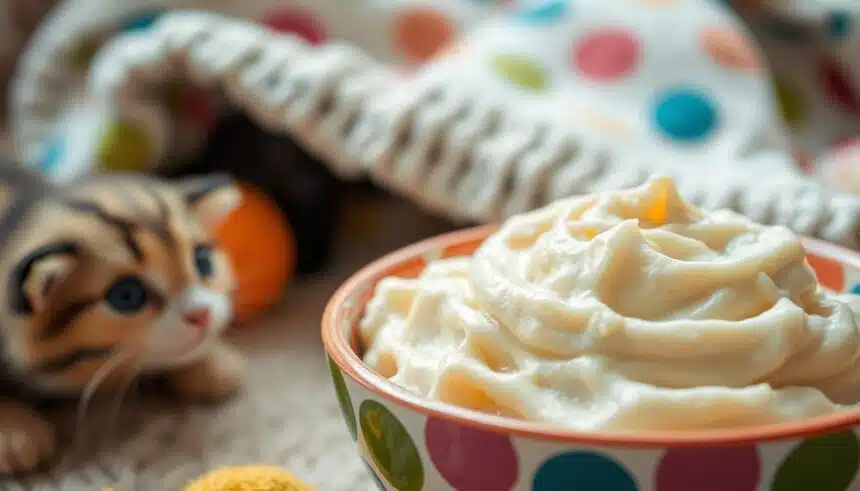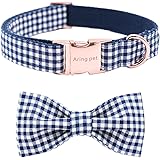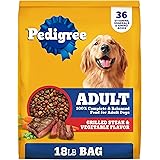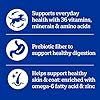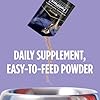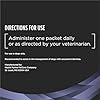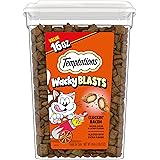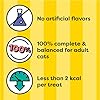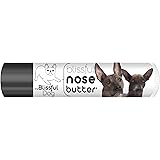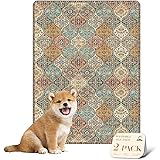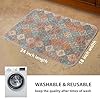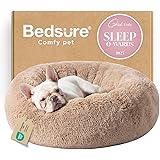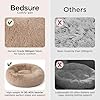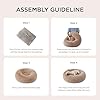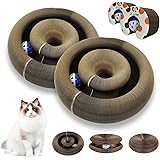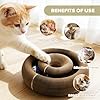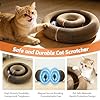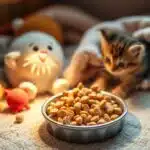As a responsible cat owner, it’s key to feed your kitten right. Soft kitten food is a great choice, offering a balanced diet. With many brands out there, picking the best can be tough. Look for a food with 35-50% protein to help your kitten grow well.
Feeding your kitten soft food has many benefits. It’s easier for them to digest and helps keep them hydrated. Choose a trusted brand that offers a mix of wet and dry food. Kittens need to eat often, about every 6-8 hours, because they eat more than adult cats. Giving your kitten the right food ensures they’ll live a healthy and happy life.
Key Takeaways
- Soft kitten food is a nutritious option for kittens, with a balanced mix of protein, fat, and other essential nutrients.
- Top soft kitten food brands offer high-quality products that meet kittens’ nutritional needs.
- Kittens require several meals a day, with a feeding schedule of three to four meals a day recommended for kittens aged six to nine months.
- Soft kitten food should contain a recommended protein range of 35-50% on a dry matter basis for optimal growth.
- Fresh, clean water should be provided at each feeding, with recommended bowl cleaning at least once a week.
- Adjustments in feeding quantities may be necessary based on the specific developmental needs of the kitten.
Understanding the Nutritional Needs of Kittens
Kittens need a special diet that’s different from adult cats. They must eat foods rich in protein, fat, and nutrients like DHA and taurine. Feeding your kitten the right food is key for their growth. Healthy soft kitten food gives them the nutrients they need for good health.
Premium soft kitten food is made to meet kittens’ unique needs. It has more protein and vitamin A than adult cat food. This is because kittens grow fast and need more nutrients.
Key Nutrients Essential for Growth
Kittens need a balanced diet with:
- High protein for muscle growth
- Fat for energy and vitamin absorption
- DHA and taurine for brain and eye health
- Calcium and phosphorus for strong bones
How Soft Food Supports Development
Soft kitten food is packed with nutrients for growth. It’s important to pick a premium soft kitten food that fits your kitten’s needs. A healthy diet supports your kitten’s health and happiness.
Benefits of Soft Kitten Food
Feeding your kitten soft wet kitten food is good for their health. It’s easy for their young teeth and gums to digest. This helps avoid dental problems and makes eating more comfortable.
Soft kitten food, like natural soft kitten food, helps keep your kitten hydrated. Kittens need a diet full of protein, fat, vitamins, and minerals. This food is also more calorie-rich, helping with their growth.
- Easier to digest for young teeth and gums
- Enhanced hydration benefits
- Higher energy density to support growth and development
When picking soft kitten food, look for high protein and fat. You can also check outcatsjoys.com to see how it compares to dry food.
Choosing the Right Soft Kitten Food
Choosing the right popular soft kitten food is key. You need to think about your kitten’s needs and how their stomach reacts. Kittens with sensitive stomachs do best with soft kitten food for sensitive stomachs. Look for these options on kitten food blogs or ask your vet.
Reading labels is important. Look for certain ingredients. Here are some things to consider:
- Protein content: Kittens need extra protein for growth and development.
- Moisture intake: Wet food can help keep your kitten well-hydrated and reduce health issues related to dehydration.
- Grain-free or grain-inclusive options: Some kittens may require grain-free food, while others may thrive on grain-inclusive options.
Kittens with sensitive stomachs should try cat food for sensitive stomachs. Always change their diet slowly to avoid stomach problems. Always talk to your vet before changing your kitten’s food.
Recommended Brands of Soft Kitten Food
Choosing the right soft kitten food is important. There are many top brands to pick from. They offer both wet and dry food to meet different needs and tastes.
Purina, Fancy Feast, and Hill’s Science Diet are among the best. They use quality ingredients and are good for kittens.
Popular Wet Food Choices
Wet food is good for kittens because it’s moist. It helps with staying hydrated and keeps teeth clean. Options like Purina One Healthy Kitten Wet Food and Fancy Feast Kitten Tender Ocean Whitefish Feast are popular.
High-Quality Dry Soft Kibble
Dry food is easy to use and there are many good brands. Look at Purina Pro Plan Kitten Dry Cat Food and Hill’s Science Diet Kitten food.
Choose dry food with high-quality proteins like chicken or fish. Avoid foods with fillers like corn. Think about what your kitten likes and needs when picking a food.
The right food for your kitten depends on their needs and likes. By looking at the best brands, you can pick the right food. This will help your kitten stay healthy and happy.
Transitioning Kittens to Soft Food
When it’s time to switch your kitten to soft kitten food, do it slowly. This helps avoid upset stomachs. Kittens usually start weaning around 5 weeks old. At this age, healthy soft kitten food can help them grow well.
Start by mixing soft kitten food with their current food. Slowly increase the soft kitten food until it’s mostly what they eat. Keep an eye on their weight and adjust their food as needed.
Signs It’s Time to Switch
Look for signs like premolars coming in, which happens around 5 weeks. Also, if your kitten wants to eat solid food easily, it’s time to switch.
Gradual Transition Tips
Here are some tips for a smooth transition:
- Begin by adding a little soft kitten food to their current food.
- Slowly increase the soft kitten food over 7-10 days.
- Watch your kitten’s weight and adjust their food as needed.
By following these steps and introducing healthy soft kitten food slowly, you can help your kitten adjust to solid food. This sets them up for a healthy eating life.
| Age | Food Type | Feeding Frequency |
|---|---|---|
| 5-6 weeks | Wet food | 4 meals per day |
| 7-10 weeks | Soft kitten food | 3-4 meals per day |
How to Serve Soft Kitten Food Correctly
Serving soft kitten food right is key for your kitten’s health. The right amount depends on their age and weight. For example, a 2-pound kitten needs about 163 kcal daily, while a 10-pound kitten requires 544 kcal.
Feed kittens 2.5 times their resting energy need for growth. This means giving them premium soft kitten food in the right amounts and at the right times. How often you feed them changes as they grow, from every 4-6 hours for kittens 2-6 months, to every 8-12 hours for those over 6 months.
Here’s a table showing how much soft kitten food kittens of different weights should get:
| Weight (lbs) | Dry Food (cups) | Wet Food (cans) |
|---|---|---|
| 2 | ⅜ | 1 ¾ |
| 4 | ⅝ | 3 |
| 6 | ¾ – ⅞ | 4 ¼ |
| 8 | 1 – ⅛ | 5 ¼ |
| 10 | 1 ⅛ – 1 ¼ | 6 ⅛ |
Watching your kitten’s weight and adjusting food amounts is crucial. This prevents over or underfeeding. By feeding them soft kitten food correctly, your kitten will grow into a healthy, happy adult cat.
Storing Soft Kitten Food Properly
Keeping soft kitten food fresh is key. The type and packaging of the food matter. For example, opened cans of wet food should be used in five to seven days. Unopened cans can last from four months to three years.
Dry soft kitten food needs a cool, dry spot. It can last six months to a year from the date it was made. Once opened, use it in 14 to 21 days.
Here are some tips for storing soft kitten food:
- Store unopened cans of wet soft kitten food in a cool, dry place.
- Refrigerate opened cans of wet soft kitten food and use within five to seven days.
- Store dry soft kitten food in an airtight container in a cool, dry location.
Follow these tips to keep your kitten’s food fresh and healthy. Always check the expiration date and follow the storage instructions from the manufacturer. This includes natural soft kitten food.
| Type of Food | Storage Instructions | Shelf Life |
|---|---|---|
| Opened Cans of Wet Soft Kitten Food | Refrigerate | 5-7 days |
| Unopened Cans of Wet Soft Kitten Food | Cool, dry place | 4 months to 3 years |
| Dry Soft Kitten Food | Cool, dry place | 6 months to 1 year |
Common Myths About Soft Kitten Food
Many pet owners are unsure about the best food for kittens. Soft kitten food is a popular choice, but myths surround it. Some think it’s too pricey or not nutritious. Yet, many soft kitten food brands offer quality and nutrients for kittens’ growth.
Some believe soft kitten food harms kittens’ teeth. But, it’s not all bad. Soft foods are easier for kittens with sensitive teeth. Many brands also offer dental benefits, like reducing tartar and plaque. Plus, some soft foods are easy to digest, helping prevent digestive issues.
Another myth is that soft kitten food is less healthy than other options. But, many brands use high-quality proteins like chicken or salmon. They are also rich in vitamins and minerals. Always talk to a vet to find the best food for your kitten.
| Food Type | Nutritional Benefits |
|---|---|
| Soft Kitten Food | High-quality protein sources, essential vitamins and minerals |
| Dry Kitten Food | Convenient, can help reduce tartar and plaque buildup |
Debunking Misconceptions
In conclusion, soft kitten food is a healthy choice for kittens. Choose a quality brand and follow feeding guidelines. This helps your kitten grow and thrive.
Signs Your Kitten Wants Soft Food
Kittens can’t talk to us, but they show us when they need soft kitten food. It’s important to know these signs to feed them right. Kittens with sensitive stomachs might need soft kitten food for sensitive stomachs to stay healthy.
Some signs your kitten wants soft food include not wanting to eat dry food or preferring wet food. If they have diarrhea or vomit after eating dry food, they might need soft kitten food for sensitive stomachs.
Here are some key points to consider when determining if your kitten wants soft kitten food:
- Refusal to eat dry food
- Preference for wet food
- Diarrhea or vomiting after eating dry food
- Increased energy needs, which may require more frequent feeding
By recognizing these signs and providing your kitten with the right soft kitten food, you can help ensure they receive the necessary nutrients for healthy growth and development.
| Age | Caloric Intake |
|---|---|
| 2 months | 150 calories |
| 3 months | 200 calories |
| 4 months | 300 calories |
Homemade Soft Kitten Food Options
For kittens with sensitive stomachs or food allergies, homemade soft kitten food is a good choice. It lets owners pick the ingredients and ensure their kitten gets the right nutrients. It’s key to add supplements like taurine and omega-3 fatty acids to support their growth.
Easy Recipes for Soft Food
There are simple recipes for homemade soft kitten food using chicken, turkey, or fish. You can find these recipes online or in pet care books. Ingredients often include chicken thighs or breast, turkey, fish, sweet potatoes, carrots, green beans, peas, and chicken or beef broth.
Nutritional Considerations
When making homemade soft kitten food, it’s important to think about kittens’ nutritional needs. They need a balanced diet with protein, fat, carbs, vitamins, and minerals. A good homemade diet includes lean proteins, healthy fats, and complex carbs. Don’t forget to add taurine and omega-3 fatty acids for their growth.
The ideal fat content in homemade cat food is 8% to 15%. Adult cats need about 1/2 to 3/4 cup of food per day, split into two meals.
Making homemade soft kitten food can save money and be healthier. It costs about $47.45 a year, compared to $104.03 for commercial food. This saves around $56.58 a year and reduces waste by saving 182.5 cans annually.
| Food Type | Annual Cost | Number of Cans Saved |
|---|---|---|
| Homemade Cat Food | $47.45 | 182.5 cans per year |
| Commercial Cat Food | $104.03 | 0 |
Monitoring Your Kitten’s Health
As your kitten grows and thrives on their soft kitten food, it’s key to watch their health closely. Look out for signs of allergies or intolerance. These can show up as digestive issues or skin problems.
A healthy kitten should play, eat, and sleep normally. If these habits change, it might mean there’s a health issue. Regular vet visits are important to keep your kitten healthy, especially when trying new premium soft kitten food.
- Changes in appetite or water intake
- Vomiting or diarrhea
- Increased scratching or licking
- Changes in stool quality or frequency
By teaming up with your vet and keeping an eye on your kitten’s health, you can help them stay happy and healthy. This is especially true when they’re eating soft kitten food.
Frequently Asked Questions About Soft Kitten Food
Feeding your kitten right is key. Many pet owners wonder about soft kitten food. They ask if all kittens need it and for how long. Soft kitten food is perfect for young kittens because it’s easy to digest and full of nutrients.
Natural soft kitten food is also a hit. It’s made with healthy ingredients and no artificial preservatives.
Some common questions about soft kitten food include:
- Should all kittens eat soft food? Yes, it’s easier for their young teeth and gums.
- How long should I feed soft food? Kittens usually eat soft food until they’re about 6 months old, then they switch to adult food.
Kittens need different nutrients at different ages. Kittens under 4 weeks need to eat often. Those over 6 months can eat twice a day. Choosing a high-quality soft kitten food, like natural soft kitten food, ensures your kitten gets the nutrients they need.
The Importance of Variety in Kitten Diet
It’s crucial to give your kitten a varied diet for their health and happiness. Mixing different flavors and textures keeps them curious and open to new tastes. This way, they get all the nutrients they need from different soft kitten foods.
When introducing new foods, start small. Some kittens might be slow to try new things. Begin by adding a little bit of the new food to their usual soft food. Then, slowly increase the amount over time. This helps avoid picky eating and keeps their diet exciting and healthy.
A varied diet also boosts your kitten’s digestive health. It exposes them to many different ingredients, which is great for kittens with sensitive stomachs or allergies. Offering a mix of top-quality soft foods ensures your kitten stays healthy and happy for years to come.


